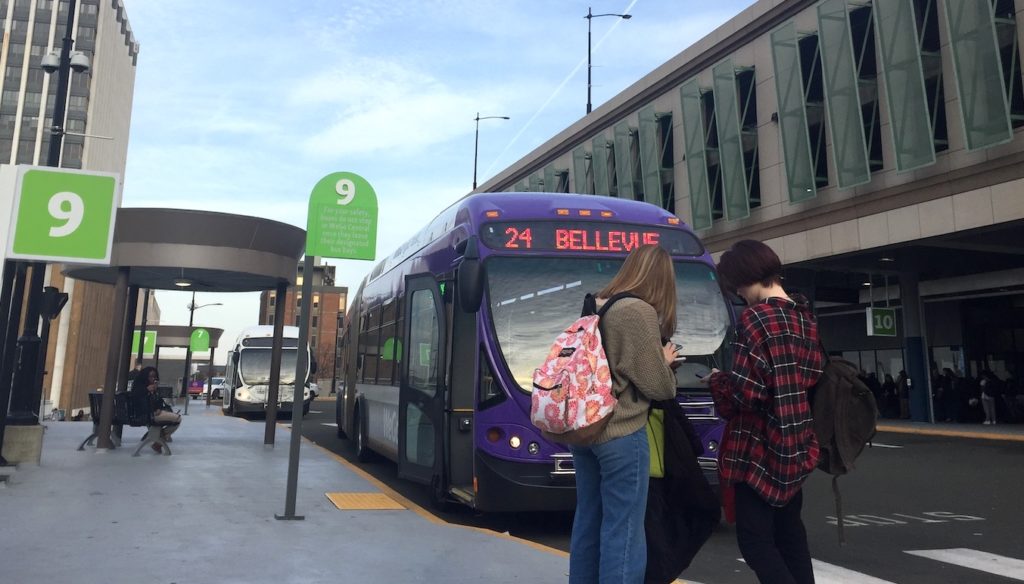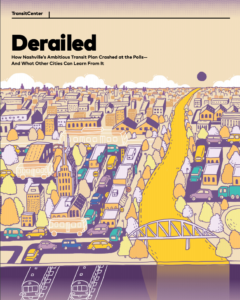
A national pro-transit group is offering a comprehensive look-back at why Nashville voters rejected a mass transit plan two years ago, and offering sharp critiques of the administration of former Mayor Megan Barry and the Nashville Area Chamber of Commerce.
The case study by TransitCenter also details how transit opponents used false — but effective — information to resoundingly defeat a package of taxes that would have funded transit.
For its Nashville report, more than 40 people were interviewed and granted anonymity, allowing those closely involved on all sides of the fight to speak frankly. (WPLN’s Tony Gonzalez was among those interviewed.)
It concludes that leaders moved too quickly to try to pass a transit plan that was too big and too expensive, that key officials failed to stress-test their ideas, and that the campaign for transit wasn’t ready to handle pushback when it arose.
“The Barry administration put together the biggest plan it felt it could pass, and the Chamber of Commerce put its full weight behind the Transit for Nashville campaign. But on election day, most Nashville voters did not feel that this plan aligned with their priorities,” the report says. “Factors combined to create unchecked momentum toward the biggest plan that the planning team could justify and … senior leaders dismissed many of the concerns raised by more junior staff.”
More: Read the report here.
In citing several factors for the referendum’s failure, TransitCenter ultimately puts less emphasis on Barry’s resignation, which locals often cite as a key reason. The report acknowledges her popularity and figurehead status in the transit campaign, but it suggests an array of mistakes doomed the referendum.
Barry’s administration overall, however, does get taken to task. The report describes a small group of advisors writing the plan too quickly, under extreme secrecy and with little input from the community.
“The secrecy was driven both by a tight timetable that demanded a final plan as soon as possible and by a desire to control the narrative,” the report states.
This “insular” arrangement also let the scope of the plan expand rapidly without enough caution or skepticism. The report says initial talks aimed for a $2-billion-project, but that it grew in “a feedback loop of escalating ambition.”
A key problem, then, was the push to build five lines of light rail. Officials reported arriving to some meetings to find that another line had been added without much discussion. And all the while, bus system improvements were ignored.
TransitCenter says a bus-centric plan could have been more popular while still being capable of handling the city’s projected ridership over the next two decades.
Mixed Messages
Once Nashville’s plan was written and unveiled, additional missteps followed. TransitCenter found that the Chamber of Commerce was too dominant among the pro-transit coalition, which struggled for months to get buy-in from grassroots groups that seemingly would have supported more public transportation.

The “Derailed” report by TransitCenter examines why Nashville’s transit referendum failed in 2018.
Proponents were also dinged for doing too little to court black voters, and for saying “too little, too late” about how mass transit impact housing.
Meanwhile, the report knocks transit opponents, like NoTax4Tracks, for running a deeply misleading campaign. But TransitCenter admits the group was effective — with special attention given to Jeff Obafemi Carr.
“A trained actor, [he] often outmaneuvered Transit for Nashville spokespeople with his ability to recite in-the-weeds financial and operating statistics, while others read from prepared notes.”
TransitCenter says the groups criticized in the case study were given a chance to interview — and in many cases did. Those who took part were also invited to review and respond to an earlier draft.

